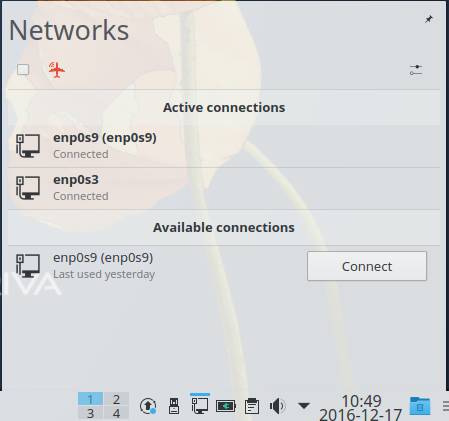De retour : nichts, keinen Nachrichten (rien, pas de nouvelles!).
Mon désir de chercher dans les “rc.d” semble pertinente, bien que cela me soit autant accessible que le chinois traditionnel crypté en AES 128!
Mais j’essaye. Dans 
/etc/rc.d/init.d/network-up
#! /bin/bash
BEGIN INIT INFO
Provides: $network $named
Should-Start: portreserve NetworkManager
Default-Start: 2 3 4 5
Short-Description: Wait for the hotplugged network to be up
Description: Wait for all network interfaces started asynchronously
at boot time.
END INIT INFO
Source function library.
. /etc/init.d/functions
NETWORKDELAY=20
DEFAULT_LINK_DETECTION_DELAY=2
MIN_LINK_DETECTION_DELAY=0
MAX_LINK_DETECTION_DELAY=$MIN_LINK_DETECTION_DELAY
ELAPSED_TIME=0
RESOLVCONF_FLAGFILE=/var/run/resolvconf/enable-updates
RESOLVCONF_DIR=/var/run/resolvconf/interface
source network configuration/etc/rc.d/init.d/network-up
. /etc/sysconfig/network
Check that networking is up.
[ “${NETWORKING}” = “no” ] && exit 0
cd /etc/sysconfig/network-scripts
. network-functions
find all the interfaces besides loopback.
ignore aliases, alternative configurations, and editor backup files
interfaces=$(/bin/ls ifcfg* |
LC_ALL=C sed -e “$__sed_discard_ignored_files”
-e ‘/(ifcfg-lo$|:|ifcfg-.*-range)/d’
-e ‘/ifcfg-[ A-Za-z0-9#._-]+$/ { s/^ifcfg-//g;s/[0-9]/ &/}’ |
LC_ALL=C grep -v ‘^ifcfg-’ |
LC_ALL=C sort -k 1,1 -k 2n |
LC_ALL=C sed -e ‘s/ ([0-9])/\1/’)
may_have_link() {
local DEVICE=$1
local LINKDELAY=0
! check_link_down ${DEVICE} || is_associating ${DEVICE}
}
is_associating() {
local DEVICE=$1
is_wireless_device ${DEVICE} || return 1
local AP=iwgetid -a -r ${DEVICE} 2>/dev/null
[ -n “$AP” ] && [ “$AP” != “00:00:00:00:00:00” ] && [ “$AP” != “44:44:44:44:44:44” ] && [ “$AP” != “FF:FF:FF:FF:FF:FF” ]
}
should_wait_network() {
for i in $interfaces; do
unset DEVICE TYPE BOOTPROTO MII_NOT_SUPPORTED PEERDNS DNS1 DNS2
unset REALDEVICE PARENTDEVICE NM_CONTROLLED
LINK_DETECTION_DELAY=$DEFAULT_LINK_DETECTION_DELAY
eval $(LANG=C grep -F “DEVICE=” “ifcfg-$i”)
eval $(LANG=C grep -F “REALDEVICE=” “ifcfg-$i”)
eval $(LANG=C grep -F “PARENTDEVICE=” “ifcfg-$i”)
eval $(LANG=C grep -F “TYPE=” “ifcfg-$i”)
eval $(LANG=C grep -F “BOOTPROTO=” “ifcfg-$i”)
eval $(LANG=C grep -F “MII_NOT_SUPPORTED=” “ifcfg-$i”)
eval $(LANG=C grep -F “LINK_DETECTION_DELAY=” “ifcfg-$i”)
eval $(LANG=C grep -F “PEERDNS=” “ifcfg-$i”)
eval $(LANG=C grep -F “DNS1=” “ifcfg-$i”)
eval $(LANG=C grep -F “DNS2=” “ifcfg-$i”)
eval $(LANG=C grep -F “NM_CONTROLLED=” “ifcfg-$i”)
[ -z “$REALDEVICE” -a -n “$PARENTDEVICE” ] && REALDEVICE=$PARENTDEVICE
[ -z “$REALDEVICE” ] && REALDEVICE=${DEVICE%%:*}
if [ $LINK_DETECTION_DELAY -lt $MIN_LINK_DETECTION_DELAY ]; then
LINK_DETECTION_DELAY=$MIN_LINK_DETECTION_DELAY
fi
if [ -z "$DEVICE" ] ; then DEVICE="$i"; fi
if [ "$BOOTPROTO" != "static" ] \
&& [ "$BOOTPROTO" != "dhcp" ] \
&& [ "$BOOTPROTO" != "bootp" ]; then
continue
fi
# Ignore Wifi network files created by NetworkManager
if [ "$TYPE" = "Wireless" ]; then
continue
fi
# only check interfaces using ifplug, other interfaces are
# started synchronously from the network service
if [ "$MII_NOT_SUPPORTED" = "yes" ]; then
continue
fi
# only check interfaces automatically launched
if LANG=C grep -q -E "^ONBOOT=['\"]?[Nn][Oo]['\"]?" "ifcfg-$i"; then
continue
fi
# ignore devices that are not present
ip -o link show ${DEVICE} &>/dev/null || continue
! is_false $NM_CONTROLLED && is_nm_running && _use_nm=true
# for NM controlled just ask NetworkManager
if [ "$_use_nm" = "true" ]; then
# Ignore disabled wifi h/w
if is_nm_device_unavailable ${DEVICE}; then
# Question: Is NM cleverer than us here? Does it do this delay
# internally and mark it as disconnected until it knows better?
# before configured delay, consider a lack of link beat
# as not ready, and unplugged thereafter
if [ $ELAPSED_TIME -lt $LINK_DETECTION_DELAY ]; then
return 0
fi
# no need to wait for unplugged devices to come up/etc/rc.d/init.d/network-up
continue
fi
is_nm_active ${DEVICE} || return 0
# The resolvconf check below uses a single generic "NetworkManager"
# DNS file, rather than device specific ones, so fudge the device.
DEVICE=NetworkManager
else
# check link beat
if ! may_have_link ${DEVICE}; then
# before configured delay, consider a lack of link beat
# as not ready, and unplugged thereafter
if [ $ELAPSED_TIME -lt $LINK_DETECTION_DELAY ]; then
return 0
fi
# no need to wait for unplugged devices to come up
continue
fi
# check address is set
ADDR=`ip addr show scope global ${DEVICE} | awk '/inet/ {print $2;}'`
if [ -z "$ADDR" ]; then
return 0
fi
fi
# wait for changes to be propagated by resolvconf if needed
if [ -e $RESOLVCONF_FLAGFILE ]; then
if [ "$BOOTPROTO" = "dhcp" -a "$PEERDNS" != "no" ] \
|| [ -n "$DNS1" -o -n "$DNS2" ]; then
if [ ! -e $RESOLVCONF_DIR/$DEVICE ]; then
return 0
fi
if [ $RESOLVCONF_DIR/$DEVICE -nt /etc/resolv.conf ]; then
return 0
fi
fi
fi
done
# all interfaces are ready
return 1
}
case “$1” in
start)
gprintf “Waiting for network to be up”
for i in $interfaces; do
LINK_DETECTION_DEL/etc/rc.d/init.d/network-up AY=$DEFAULT_LINK_DETECTION_DELAY
eval $(LANG=C grep -F "LINK_DETECTION_DELAY=" "ifcfg-$i")
if [ "$LINK_DETECTION_DELAY" -gt $MAX_LINK_DETECTION_DELAY ]; then
MAX_LINK_DETECTION_DELAY=$LINK_DETECTION_DELAY
fi
done
NETWORKDELAY=$(( NETWORKDELAY + MAX_LINK_DETECTION_DELAY ))
while should_wait_network && [ $ELAPSED_TIME -lt $NETWORKDELAY ]; do
sleep 1
let ELAPSED_TIME=$ELAPSED_TIME+1
done
[ $ELAPSED_TIME -ge $NETWORKDELAY ] && failure || success
echo
;;
stop)
;;
*)
gprintf “Usage: %s\n” “$(basename $0) {start|stop}”
exit 1
esac
exit 0
Nous sommes (peut-être) proches du but; mais comme tout cela est très limpide, je suis embarrassé par cette trop grande limpidité.
Dans /etc/rc.d, init.d me semble être le plus utile.


